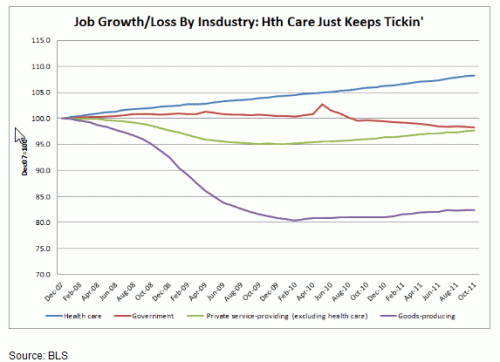Jared Bernstein points out a reality that health care could be understood as the only part of the economy that never has a recession (and so health sector employment is up 1.4 million jobs since Dec. 2007 while total employment is down by 6.5 million jobs).
* government has a deep footprint in health care, accounting for about half of the sector’s expenditures, so that’s obviously made a difference in its immunity to recession (and another e.g. of why the conservative meme “government doesn’t create jobs” is so foolish and wrong);
* our aging demographics certainly generate increasing demand for health services;
* demand for health care tends to be pretty inelastic…I’m sure there’s a falloff in cosmetic surgery in recessions, but you get sick enough, you’ll go to the doctor, regardless of the unemployment rate (at least, you will if you have coverage);
* health services tend to be non-tradable; also, jobs there are less susceptible to replacement by labor saving technology—a home-health aide isn’t likely to be replaced by a robot anytime soon…at least I hope not.
This is obviously mixed news since we need to create jobs and slow down health care cost inflation. A true conundrum, made more complicated by the fact that increased productivity could aid in slowing health care cost inflation. Austin provides some useful context and a more focused post that notes that productivity gains in health care (wages rising, but not necessarily producing more care) lag behind other sectors (though the research discussed by Austin was unable to control for quality which is a problem)–you can read more here.


